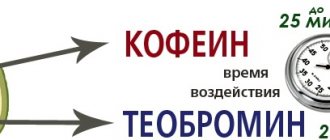There are many reasons to start drinking coffee, and only one reason to stop - health. It requires constant attention, so moderation in everything is the key to a fulfilling life. Modern scientists have removed many false accusations against coffee, but continue to insist on maintaining reasonable standards in its use. Why can't you drink a lot of coffee?
How does coffee affect the body?
The influence of coffee is due to the unique composition of the beans, in which scientists have counted hundreds of active ingredients: amino acids, proteins, polysaccharides. The active element is a natural biostimulant - caffeine. The chemical composition of the grain explains the invigorating effect, rich bouquet of taste and pleasure that a person experiences from drinking the drink.
Too large doses of coffee lead to an overdose of caffeine and other active substances, which leads to malfunctions in the body.
Various studies have proven that the moderate effect of coffee on a relatively healthy body is stimulating.
- Metabolic processes are accelerated.
- The speed of thinking increases.
- The speed of information processing increases.
- Muscle tone increases.
- Hormones are more actively produced: adrenaline, serotonin and dopamine. They are responsible for the feeling of pleasure and general tone of the body.
- Digestion improves.
- Blood circulation activity increases.
All these positive effects can be felt by judicious consumption of natural coffee. But what happens if the caffeine dose is exceeded?
Nausea after drinking a drink
If you feel nauseous after drinking coffee, it is impossible to reliably pinpoint the only source of the problem. Typically, this symptom appears for one of the following reasons:
- Beverage abuse . In case of an overdose, nausea from coffee occurs as the body's response to excess toxins. The reason for this reaction is dehydration due to the large expenditure of fluid to eliminate the toxin (that is, nausea is associated with a lack of water).
- Often sick from coffee due to irritation of the gastrointestinal mucosa , when a person is on the verge of an ulcer or gastritis. In this condition, gastric juice irritates the walls of the stomach, which leads to vomiting. This reaction is also noticeable when drinking on an empty stomach.
- In diseases of the cardiovascular system, the symptom may be a consequence of increased blood pressure. Caffeine provokes additional release of adrenaline and dopamine, accelerating the heartbeat and breathing - blood pressure increases, which is accompanied by nausea, dizziness and weakness.
- Another substance whose production is stimulated by caffeine is cartisol, a stress hormone. Anxiety in heavy coffee drinkers can cause nausea.
- Sometimes vomiting after drinking coffee is associated with the body's individual reaction to the substance. Intolerance usually affects pregnant women and women at certain stages of the menstrual cycle.
- In the modern market, it is not uncommon for nausea to be associated with poor product quality . For example, instant coffee consists of 80% chemical additives, and the inscription “100% Arabica” is just an advertising ploy.
- Nausea may be caused by the calorie content of the drink . If it contains nutritional toppings or full-fat milk, the body may react in a similar way.
What are the dangers of a caffeine overdose?
It is necessary to distinguish between the dangers of a one-time overdose of coffee and systemic abuse of an invigorating drink. Each condition is dangerous in its own way.
Drinking too much coffee at once
The main reason for poor health in this case is the rapid accumulation of caffeine in the body. The effect of the stimulant is felt 15-20 minutes after drinking coffee, reaches its peak after 45-60 minutes, then declines. The period for complete removal of a portion of caffeine obtained from one cup of coffee is from 4 to 6 hours. The interval between doses of the drink should be at least 3-4 hours. If you drink several servings of espresso in an hour, then a significant dose of caffeine will inevitably accumulate at one time, although individual reactions to it may vary.
Possible consequences of drinking too much coffee at once.
- Cardiopalmus.
- A sharp narrowing of the blood vessels in the brain, which leads to a feeling of weakness, dizziness, or even fainting.
- Nausea.
- Diarrhea.
- Symptoms of dehydration include dry mouth, dizziness, and confusion.
- Increased sweating.
Regular coffee abuse
Regular coffee abuse causes an overload of the nervous system, which constantly has to work under stress. Constant stimulation of hormonal release depletes the body's systems. At the same time, symptoms of coffee addiction arise, when a portion of a very strong drink is needed not for vigor, but simply to feel “normal.” As a result, constantly exceeding coffee standards leads to an effect that is directly opposite to that of a cup of coffee with moderate consumption.
A constant overabundance of caffeine can lead to a number of unpleasant consequences, so you should not drink a lot of coffee on a regular basis. These include:
- Insomnia.
- Irritability.
- Decreased appetite.
- Decreased activity of thought processes.
- The emergence of caffeine addiction.
- Exacerbation of chronic diseases.
Don't Panic: Some Caffeine Detox Secrets
Often, friendly gatherings over a cup of coffee take place in a cramped coffee shop, where there are a lot of people and a terrible shortage of air. All this aggravates the effect of caffeine on the body and can lead to unpleasant consequences.
If you discover these symptoms in yourself or one of your friends, you should not panic. Here are a few simple techniques that will help neutralize the effects of caffeine and avoid the consequences of an overdose:
- If you are in a stuffy room, go outside. A walk in the fresh air will saturate the body with oxygen, restore heart rate and relieve pressing anxiety.
- At the first symptoms of an overdose, you need to drink a lot of fluid. Water will dilute the excess caffeine intake and help quickly cleanse the body of waste products.
- If you don't feel nauseous, eat a banana. Citrus juice is perfect. The high content of potassium and vitamin C will fill the lack of microelements and return the heart to a healthy rhythm.
- In a more serious case: numbness of the limbs, blue discoloration, loss of consciousness, call an ambulance without delay.
. Treat your body with respect and avoid excessive consumption of coffee. Even if this was your norm before, keep in mind that in a state of illness the body’s resistance decreases. Let the coffee ceremony continue to be associated with pleasant moments.
A lot of coffee, how much is that?
The exact determination of the optimal daily dose of coffee depends on many factors. Recent studies by South American scientists suggest that susceptibility to the drink is regulated by genes. Still, there are general guidelines that you can follow.
- 3 cups of coffee a day is a safe norm for a relatively healthy person.
- 6 cups of coffee is the maximum allowable portion for normal well-being.
- More than 6 cups of coffee per day is a sign of coffee addiction.
The time chosen for drinking coffee also matters.
- Drinking coffee on an empty stomach is not a good idea, especially if you have systemic problems with the stomach or neurovascular system. The drink is best absorbed by the body after a meal, so coffee should complete a meal and not replace it.
- The last coffee intake should occur no later than 6 hours before bedtime, so as not to interfere with the nervous system’s adjustment to rest. The optimal time for drinking coffee is the first half of the day, before 16-17 hours.
Coffee norm: subjective opinion or scientific fact
In 2022, a groundbreaking study was published in the British Medical Journal involving 402,260 people aged 50 to 71 years. By analyzing the relationship between coffee consumption and the risk of death, scientists have determined the optimal balance between health and pleasure.
Four to five cups of aromatic drink a day will not only not harm your health, but will also saturate the body with beneficial substances and antioxidants, and minimize the risk of cardiovascular diseases. The mortality rate of elderly people who enjoyed 5 cups of coffee daily was much lower than those who did not drink the drink at all or consumed smaller amounts.
A cup of coffee contains a rich composition of vitamins and microelements
From a nutritional point of view, coffee is a storehouse of microelements that the body needs for life support. Imagine a standard cup of coffee (240 ml) contains:
- Vitamin B2 (riboflavin) – 11% of DV;
- Vitamin B5 (pantothenic acid) – 6% of DV;
- Vitamin B1 (thiamine) – 2% of DV;
- Vitamin B3 (niacin) – 2% of DV;
- Folate – 1% of DV;
- Manganese – 3% of DV;
- Potassium – 3% of DV;
- Magnesium – 2% of DV;
- Phosphorus – 1% of DV.
DN - daily consumption rate.
Drinking 4-5 cups of coffee a day will only bring benefits to the body.
It seems like a little, but if you multiply it by the number of cups you drink, you get a good bonus of nutrients and antioxidants for the body.
What happens if you drink a lot of coffee - conclusion
Drinking coffee in large quantities and at the wrong time does more harm than good or pleasure, so it is not recommended to drink a lot of coffee.
If you drink a lot of coffee at once, you may experience a caffeine overdose. Regularly exceeding the coffee norm is fraught with overstrain of the nervous system, insomnia and even exacerbation of chronic diseases.
The safe amount of coffee for a healthy person is 1-3 cups per day.
Drink coffee in reasonable quantities and have fun!
Two cups of coffee protects against Alzheimer's disease
Two cups of coffee is a safe and healthy amount for most people. And scientists from the University of Florida have found that this is exactly the amount of drink you should drink to prevent the development of Alzheimer's disease and dementia in old age.
For pregnant women, this is the maximum permissible “dosage”, and it is better to limit yourself to one cup per day. Caffeine promotes excessive mobility of the baby, and the expectant mother will experience discomfort.
Addiction
This is another confirmation that a lot of coffee acts as a drug for humans. It would be stupid to compare caffeine with heroin or cocaine, but the dynamics and course of the addiction itself are similar. And note that one cup is not enough for you, you brew another one to come to your senses in the morning. And after a month their number simply increases. Will you still say that coffee is not bad for you?
If a person begins to struggle with caffeine and stops drinking it in large quantities, then after a while he may experience the following symptoms:
- weakness;
- irritability;
- increased fatigue;
- dizziness.
This is the so-called withdrawal syndrome. All symptoms can be relieved by drinking a cup of strong invigorating drink. To break this vicious circle, a person must not only understand that it is harmful to be so dependent on an invigorating drink, but also have remarkable willpower.
Coffee benefits and harm to health
Kitchen. Early morning. A cup of aromatic coffee is steaming on the table... Is this a familiar picture? According to statistics, 90% of the country's adult population starts their morning with this invigorating drink. And then they continue to drink coffee throughout the working day. Coffee has acquired many legends today. So what is it really like?
Caffeine and its benefits
The main product found in coffee is caffeine. Caffeine is a moderate stimulant. The effects of caffeine on people vary depending on their sensitivity to this component. Some drink several cups a day without any effect on them, while others may feel changes from even one serving of coffee. The property of caffeine is such that after entering the digestive system, it quickly dissolves in the body, being eliminated within a few hours after consumption. This is why coffee has a diuretic effect.
Caffeine increases dopamine levels in the brain, which makes us feel more alert and cheerful. Drinking coffee in moderation has a positive effect on the central nervous system: improves mood, increases physical and mental activity. Knowledge workers who drink 2 cups of coffee a day cope with work much faster than their colleagues who refuse to drink coffee - this was the conclusion reached by American researchers who studied the effect of caffeine on human mental abilities. However, it is difficult to determine a favorable dose on your own. After all, the effect of caffeine on each person is individual and depends on the type of nervous system.
Facts about coffee
Is drinking coffee harmful or beneficial? There is no clear answer to this question. Of course, coffee is harmful in large quantities and when consumed frequently, just as any other frequently consumed product is harmful. Coffee is prescribed both for its miraculous properties and for its ability to cause great harm. Let's figure it out.
Coffee affects the central nervous system
This is indeed true. As mentioned above, coffee is a stimulant of the central nervous system. However, exceeding the individual dose of a person leads to depletion of nerve cells, disruption of the normal functioning of the body: fatigue, lethargy, and decreased ability to work appear.
Coffee causes insomnia
Drinking coffee at night can cause insomnia. However, this effect is not observed in everyone. Those who constantly “sit” on coffee get their body so accustomed to this drink that it ceases to be a stimulant. And, nevertheless, it is not recommended to drink coffee after five o'clock in the evening.
Coffee and pills
Caffeine tends to weaken or enhance the effect of certain medications. That is why if you are an avid coffee drinker, then you should check with the doctor who prescribed your medications whether you can drink coffee with tablets. But antidepressants should not be accompanied by drinking coffee, since this product suppresses their effect.
Caffeine increases the risk of heart disease
Coffee actually increases cardiac activity. However, healthy people who drink coffee in moderation showed no tendency to develop cardiovascular diseases. No studies have confirmed a link between coffee consumption and heart attacks. People who are particularly sensitive to caffeine may experience an increase in blood pressure, but, as a rule, this only occurs for a few hours. Therefore, elderly people are not recommended to drink coffee.
Coffee and cancer
It has long been believed that there is a direct link between cancer and coffee consumption. The research was carried out over a long period of time. However, no assumptions about the relationship between the occurrence and development of cancer and coffee consumption were confirmed.
Are coffee and cigarettes a bad combination?
Many people like to drink coffee with a cigarette. Studies have shown that smokers drink significantly more coffee than non-smokers. Nicotine tends to remove caffeine from the body more quickly. Consequently, the smoker is more likely to need caffeine. According to research, those who quit smoking do not decrease their need for caffeine for about six months. It should also be noted that decaffeinated coffee more often causes the need for a cigarette. The combined use of coffee and cigarettes further increases the risk of developing arterial hypertension and may increase the manifestations of atherosclerosis of the arteries.
Coffee cures hangovers
This is the most common myth about the benefits of coffee. Caffeine is not an antidote to drunkenness, except that it gives the person himself a feeling of relief after a cup of coffee. But this is caused solely by the consciousness of the person himself. Coffee can only lift your tone a little. All the effects caused by alcohol are not neutralized by caffeine.
Coffee is addictive
By exceeding his individual dose, a person becomes dependent. Stopping coffee consumption can cause discomfort in the body: fatigue, drowsiness, headache, irritation and even depression. After a cup of coffee, these symptoms disappear. Problems usually begin to arise 12-14 hours after drinking the last portion of the drink. Everything here is the same as with sweet tooth lovers who decide to go on a diet. It is enough to endure a week or two without your favorite product, and the addiction stops.
Interestingly, the caffeine content in brewed coffee is 380-650 mg/l, in instant coffee – 310-480 mg/l, in Espresso coffee – 1700-2250 mg/l. The drink "Cola" contains about 100 mg/l of caffeine.
Author of the article Natalya Gorshkova
Expert commentary
Physician-therapist, chief physician of the multidisciplinary clinic Dialine, Dzerzhinsky district Anna Tsybulina:
“People with cardiovascular diseases should not drink coffee, incl. arterial hypertension (increased blood pressure), vascular atherosclerosis, arrhythmias, diseases of the endocrine system (including the thyroid gland, adrenal glands, diabetes), diseases of the kidneys, stomach and duodenum, since it indirectly stimulates the production of adrenaline and hormones similar to it, which enhances the already disturbed imbalance of the autonomic nervous system and can provoke a worsening of the course of the listed diseases.
Also, excessive coffee consumption is not recommended for young people and girls planning to have children.
A healthy young person can drink no more than 1 cup of coffee per day with a concentration of less than a teaspoon of coffee per glass of boiling water; it is better to dilute the coffee with milk. I recommend using coffee that you have just ground from beans, rather than instant coffee.
The best time to drink coffee is morning. Exceptions are cases when there is a state of severe hypotension accompanied by a decrease in pressure. Then the doctor may recommend drinking coffee or strong tea to bring the patient out of the threatened state, regardless of the time of day. However, you cannot independently “prescribe” coffee for yourself to take every day with low blood pressure!”
Cardiovascular system and caffeine
Drinking a tasty drink in large doses is extremely harmful to your body. And it’s all the fault of caffeine, which is found in every cup of invigorating “nectar”.
Essentially, it is a natural, powerful stimulant, thanks to which people quickly get ready for work in the morning.
But not everyone knows that coffee affects your blood vessels and, of course, your heart. If you manage to drink more than four cups in the first half of the day, then prepare for the fact that after a while you may experience tachycardia and headaches. As you can see, drinking countless cups of caffeine is bad for your body, and the more you continue to feel, the worse you will feel. It’s a no-brainer that it’s hard to get a heart attack, unless you’re heavy on cigarettes, but you can get a bunch of cardiac problems.
Five cups of coffee protects the liver
If you have liver disease, coffee should be in your diet. Five cups daily protect against pathological processes: the degeneration of hepatitis into cirrhosis, and cirrhosis into cancer. The reason for this is antioxidants, which protect hepatocytes from damage and help liver cells recover. Scientists from the National Cancer Center (Japan) found this out.
Five cups is a caffeine dosage that not everyone can handle. If you drink this amount of drink (or more) every day, there is a high risk that the body will suffer from dehydration. Caffeine activates the kidneys and has a diuretic effect, so for every cup of espresso you need to drink an additional glass of water. That is, another liter of water per day in addition to the usual drinking regime, and this is hardly possible.











